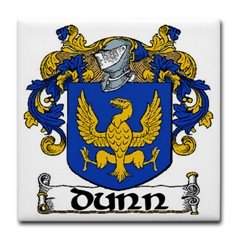
Surname Origin and History
This cartoon is silly, but it leads us into the subject of how we obtained our names, which I find interesting. These days we generally take having first, middle and last names for granted. However, it wasn't always this way. In times past, people in most cultures went by just one name, their "given" name. Over time, that began to change. For example, during Biblical times people were often referred to by their given names and the locality in which they resided, such as "Jesus of Nazareth" and "Saul of Tarsas". However, as populations grew, the need to identify individuals by surnames became necessary.
European surnames first emerged between the eleventh and fifteenth centuries. Prior to this, particularly during the "Dark Ages" between the fifth and eleventh centuries, people were largely illiterate, lived in rural areas or small villages, didn’t travel very far, and had little need of distinction beyond their given names, or what we today call “first” names - or more formally, "forenames".
♦♦♦
The development of surnames has been affected by many factors, including social class, social structure, cultural tradition, and naming practices in neighboring cultures. The majority of surnames are derived from patronymics, i.e. the forming of a surname from the father's given name such as Johnson, meaning literally "the son of John." In some rare cases, the naming practice was matronymic, where the surname was derived from the mother's given name.
In Ireland a male's surname generally takes the form Ó/Ua (originally "grandson") or Mac ("son") followed by the genitive case of a name, as in Ó Dónaill ("grandson of Dónall") or Mac Gearailt ("son of Gerald"). In other words, the tradition was to use the prefix "Mac" to indicate that the bearer of that name was the "son of" someone and the prefix "O" to indicate that the bearer was a grandson. Thus, O'Reilly was the grandson of Reilly and MacDonald was the son of Donald. An interesting article about Irish names can be found here.
English Surnames Generally Fall Into Four Broad Categories
■ Those derived from personal names: Richards, Jones [Jon being a variation of John], Johnson, Robinson, Thomas, Martin, Williams, Matthews, Jackson, etc.
■ Those derived from place names or geographic features: Essex, Kent, York, Telford, Stokes, Carlisle, London, Marston, Lancaster, Charlton, Dover, Wood, Hill, Bush, Green, Field, Moore, Moss, Marsh, Waters, Lake, Hedges, Banks, Burn, Hall, Towns, etc.
■ Those derived from occupations: Butcher, Baker, Smith, Mason, Shepherd, Farmer, Cooper, Hooper, Fletcher, Thatcher, Taylor, Wright, Skinner, Carpenter, Joiner, Weaver, Cook, Miller, etc.
■ Those derived from nicknames or physical descriptions: Grey, Black, White, Green, King, Lord, Baron, Earl, Noble, Bishop, Bold, Strong, Armstrong, Quick, Young, Long/Lang, Short, Broad, etc.
Similar naming methods occurred in other languages. Some immigrants retained the original spelling when they arrived on our U.S. shores, but some anglicized their names to better fit into their new society. For example, one of our ancestral lines is Schwarz, which means Black in German. Our ancestors in this line retained the original spelling, but others changed their names to Black after they arrived here.
This diversified approach to naming people has led to a rich, interesting tapestry of surnames in this country - and around the world.
♦♦♦
Surname spelling and pronunciation have evolved over centuries, with current generations often unaware of the origin and evolution of our surnames. Among the humbler classes of European society, and especially among the illiterate, individuals had little choice but to accept the mistakes of officials, clerks, and priests who officially bestowed upon them new versions of their surnames.
In North America, the linguistic problems confronting immigration officials at Ellis Island in the 19th century were legendary as a prolific source of Anglicization. In the United States such processes of official and accidental change caused Bauch to become Baugh, Micsza to become McShea, Siminowicz to become Simmons, etc. Many immigrants deliberately Anglicized or changed their surnames upon arrival in the New World, so that Mlynar became Miller, Zimmerman became Carpenter, and, as discussed above, Schwarz might become Black.
Hence, regardless of the current spelling of our surnames, the spelling and pronunciation have evolved over the centuries. In some cases, the current generation may be aware of the change. A schoolmate of mine in the 1950s whose name was Sylvestrovich had become Silvers when I encountered him in the 1970s. His children and other family no doubt know of the change. However, in many cases a change of surname occurred so long ago that we are not aware of the original spelling and pronunciation.
The origin and history of surnames can be very interesting, particularly to the bearer of that surname.
Heraldry and Coats of Arms
Heraldry emerged in western Europe in the 12th century to meet the necessity for military identification. It was originally developed by the military aristocracy as a hereditary system of identification using visual symbols.
The term is commonly accepted as pertaining to the devising, granting, and use of Coats of Arms, or armorial bearings. This type of symbolism became so popular that it was soon adopted by civilian individuals and by corporate bodies such as town governments, universities, and the church, and eventually by regiments and national states.
A Coat of Arms was originally a light tunic (i.e. a surcoat extending down to the knees) decorated with symbols and worn over battle armor. The symbolism served to identify the wearer (whose face might be covered by the visor of his helmet) as the member of a particular family or group. The symbology itself eventually became known as a Coat of Arms.
This article is adapted from this source and this source.
Last updated 4/2/2010


No comments:
Post a Comment